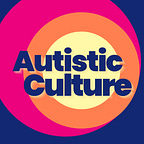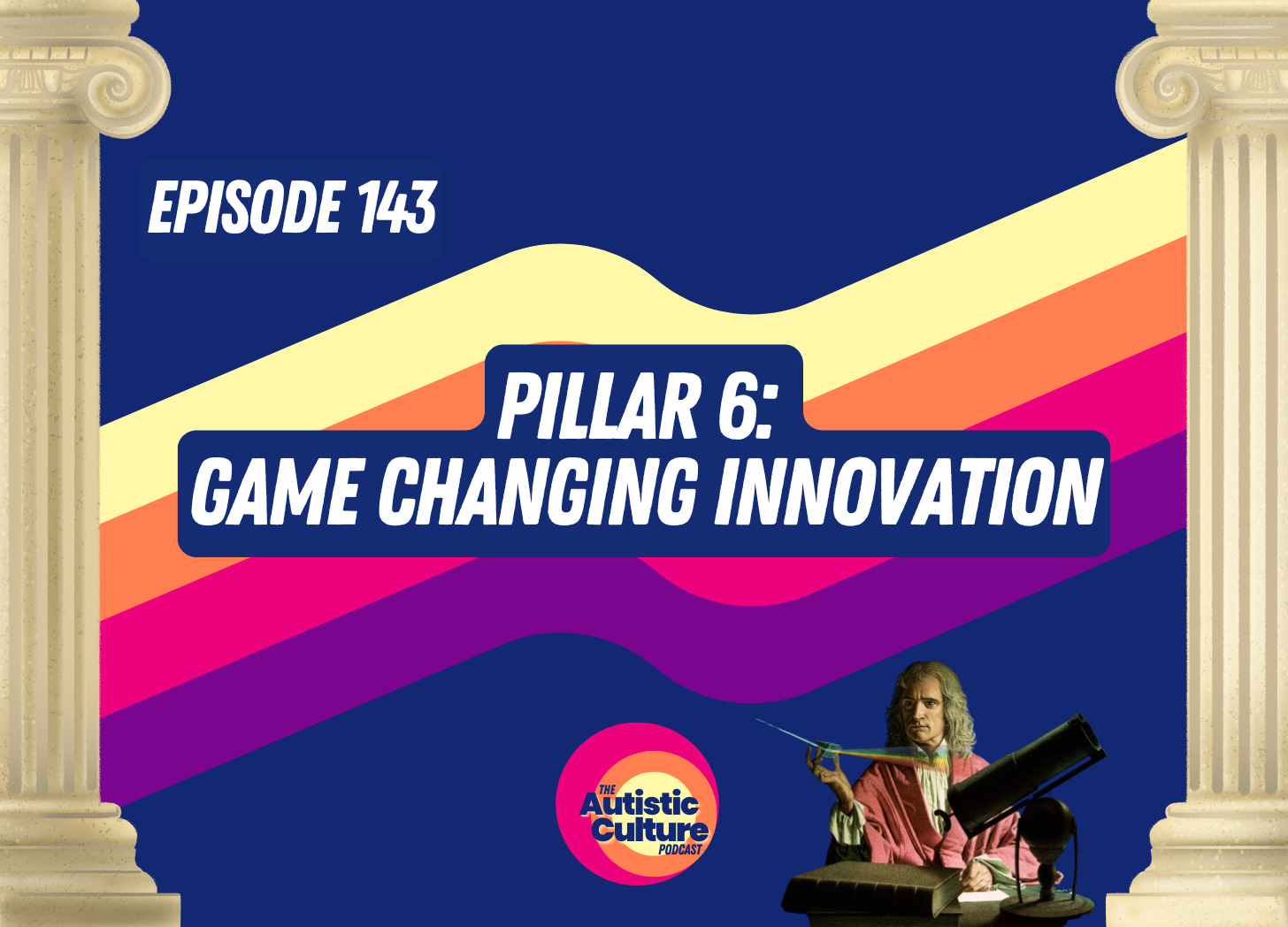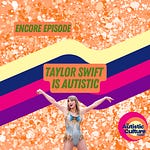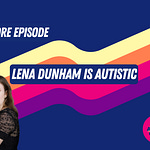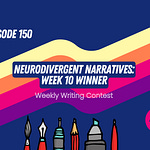An episode that didn’t just think outside the box—it questioned why there’s a box in the first place!
In Episode 143 of The Autistic Culture Podcast, Dr Angela Kingdon continues our journey through the 10 Pillars of Autistic Culture as we move onto Pillar 6 — Game Changing Innovation. Autistic innovation isn’t about trends or flash. It’s about paradigm shifts. It’s about seeing what no one else is looking for, hyperfocusing on what matters, and rebuilding the world, system by system.
Dr Angela looks deep into the game-changing transformations developed by Autistic game changers, such as Sir Isaac Newton, who invented Calculus, Sir Richard Branson’s out-of-the-box business models, and Angela’s father’s innovations in creating build-your-own Hot Rod kit cars.
Here’s what defines this core Autistic trait:
Autistic people challenge assumptions, not to be difficult, but because we can see the assumptions in the first place.
Neurodivergent people innovate through sensory truth, emotional intensity, and process precision.
Autistic people don’t disrupt the status quo to seek attention. We disrupt because the system doesn’t make sense, and we can’t unsee that.
Game changers in autistic culture often challenge capitalist efficiency with a call for meaning, integrity, and alignment.
Many autistic innovators aren't seen as leaders until the world catches up to their vision.
Historical and modern change agents in autistic culture often operate without blueprints, forging their own.
Key Concepts:
Game-changing is not about chasing disruption for its own sake. It’s about building entirely new paradigms based on noticing what others overlook.
Autistic game changers are pattern-breakers and system rewriters — not trend-followers.
Our deep focus and drive for autonomy let us find wholly new approaches to enduring problems.
Emotional intensity and sensory insights fuel world-building innovation.
It's often misunderstood or resisted because the new paradigm doesn't fit existing frameworks.
💭 Here’s what to listen for through the lens of being a Game Changer and how to lean into them instead of masking:
🧠 Lean In: Solve the problem no one else is trying to solve.
🎭 Mask: Wait for permission to innovate.🧠 Lean In: Say the thing others avoid.
🎭 Mask: Stay quiet to keep things smooth.🧠 Lean In: Build your own tools when none exist.
🎭 Mask: Settle for tools that don’t work for your brain.🧠 Lean In: Follow sensory intuition.
🎭 Mask: Override your gut to fit neurotypical norms.🧠 Lean In: Let emotional intensity guide your purpose.
🎭 Mask: Detach to appear professional.🧠 Lean In: Hire people better than you.
🎭 Mask: Try to do it all yourself.🧠 Lean In: Prioritize purpose over polish.
🎭 Mask: Get stuck perfecting instead of launching.🧠 Lean In: Lead through clarity, not control.
🎭 Mask: Micro-manage to feel safe.🧠 Lean In: Share your innovations, even if they feel “weird.”
🎭 Mask: Water down your ideas for palatability.🧠 Lean In: Build systems around your vision.
🎭 Mask: Work inside broken ones to avoid attention.
So, whether you’re autistic, exploring the possibility, or just someone who loves and respects autistic people, you are welcome here.
We’re saving you a seat!
This episode is a part of our Start Here Series, which is designed for new listeners of the show who are wondering, “where should I start?” to have a solid foundation for their experience here. It’s also for loyal listeners to begin to more fully embody the pillars of Autistic culture with more clarity and pride. Join the convo with #AutisticCulture!
Resources:
Angela’s talk at TEDx Tamworth that references Sir Isaac Newton as a Game changer
Make ‘Em Beg To Work For You: 7 Steps to Find, Hire, Manage, Reward, and Release All-Star Players to Help Make Your Dream a Reality: Book on Amazon https://amzn.eu/d/fDJXaaT
Big Magic: Creative Living Beyond Fear by Elizabeth Gilbert - https://amzn.eu/d/iQCn8Rd
Lessons in Chemistry TV show: In the 1950s, Elizabeth Zott's (Brie Larson) dream of being a scientist is challenged by a society that says women belong in the domestic sphere; she accepts a job on a TV cooking show and sets out to teach a nation of housewives way more than recipes.
Bohemian Rhapsody Movie: With his impeccable vocal abilities, Freddie Mercury (Oscar Winner Rami Malek) and his rock band, Queen, achieve superstardom. However, amidst his skyrocketing success, he grapples with his ego, sexuality, and a fatal illness.
Related Episodes:
🎬 Episode 4 – Industrial Light & Magic
Game Changer: George Lucas imagined a sci-fi story that required technology no one had invented yet, so he invented the technology. ILM didn’t just upgrade filmmaking—it transformed the entire system of visual effects. That’s autistic world-building in action: noticing what’s missing, refusing to accept limits, and constructing tools for an imagined reality others can’t see yet.
Game Changer: Steve Jobs didn’t just make computers—he transformed them into sensory objects. He prioritized intuitive design, haptics, visual simplicity, and user flow, rooted in exteroception and autistic sensory logic. Apple didn’t follow tech trends; it redefined how we interact with machines. This is autistic innovation: form follows feeling.
📸 Episode 37 – Eadweard Muybridge
Game Changer: Muybridge turned a hyper-specific visual question—do all a horse’s legs leave the ground at once?—into the birth of motion pictures. His obsessive pattern-tracking and refusal to let the invisible remain unseen reshaped visual storytelling. That’s autistic attention to detail reframing what’s possible in photography, science, and cinema.
Game Changer: Hannah Gadsby didn’t just perform a comedy special—she dismantled the genre. By naming trauma, breaking structure, and confronting the audience directly, Nanette challenged what comedy is for. That’s autistic communication: truth-first, form-second. Game-changing by turning the mirror back on the audience.
👩🔬 Episode 56 - Lessons in Chemistry is Autistic
Game Changer: Lessons in Chemistry reframed a 1960s kitchen as a chemistry lab—and a battleground for gender equality. Elizabeth Zott’s scientific precision and refusal to dumb herself down turned a TV cooking show into a feminist manifesto. That’s autistic-level clarity and focus, redefining women’s roles in science, media, and domestic life.
🎶 Episode 73 – Freddie Mercury
Game Changer: “Bohemian Rhapsody” broke every rule of commercial radio—and still became iconic. Freddie Mercury fused opera, rock, theatricality, and queerness into a new musical grammar. This was autistic genre-melding, sensory richness, and emotional intensity, reshaping pop culture forever.
🍽️ Episode 81 – Anthony Bourdain
Game Changer: Bourdain changed food television from recipe-sharing to relationship-sharing. He centered voices on the margins, told uncomfortable truths, and used food as a lens for global justice. That’s autistic moral clarity—deep empathy meeting pattern recognition—and it flipped an entire genre on its head.
Game Changer: Martha didn’t just elevate homemaking—she turned it into an empire. With autistic-level detail, systems-thinking, and sensory perfectionism, she reframed “women’s work” as art and strategy. That’s autistic innovation: redefining the value of precision, process, and aesthetic ritual.
Follow us on Instagram
Find us on Apple Podcasts and Spotify
Learn more about Angela at AngelaKingdon.com
Our Autism-affirming merch shop


